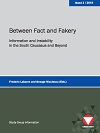Between Fact and Fakery
16th Workshop of the PfP Consortium Study Group "Regional Stability in the South Caucasus”
Dokumenttyp:
Study Group InformationErscheinungsdatum:
Februar 2018Herausgeber:
Dr. Frédéric Labarre, Dr. George NiculescuVerlag:
Study Group Information - Austrian National Defence Academy in co-operation with the PfP Consortium of Defense Academies and Security Studies InstitutesISBN:
978-3-903121-33-1Seiten:
240Autor(en):
Ahmad Alili, Hrachya V. Arzumanian, Thomas Fasbender, Akaki Gvimradze, Vaso Kapanadze, Dr. Frédéric Labarre, Irina Lysychkina, Ruben Mehrabyan, Shushanik Minasyan, Dr. George Niculescu, MA, PhD Elkhan Nuriyev, Razi Nurullayev, Kieran Pender, Benyamin Poghosyan, Sadi Sadiyev, Prof. Dr. Peter W. Schulze, Dariia Serikova, David Shahnazaryan, Gregory Simons, Jens WendlandBeiträge in dieser Publikation:
Vorwort
Fake news is a theme of extreme urgency but not a new phenomenon. The information revolution allowed this practice of misinformation to gain extremely far-ranging consequences for political regimes, society and the media itself - and this is the novelty.
The 16th RSSC SG publication examines the impact of false reporting on the development of a free media environment in the South Caucasus, on the stability of regional regimes and on the competition for power and influence by large players in the region. Within this framework, this publication amongst others discusses whether false reporting could ever be justified, even for positive motives, and how information warfare could be turned into information peacefare.



